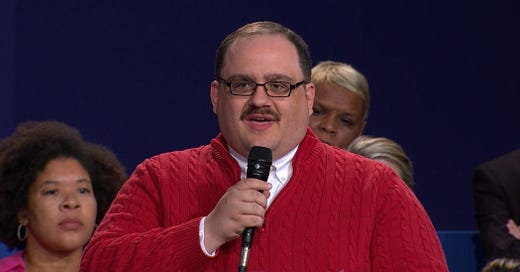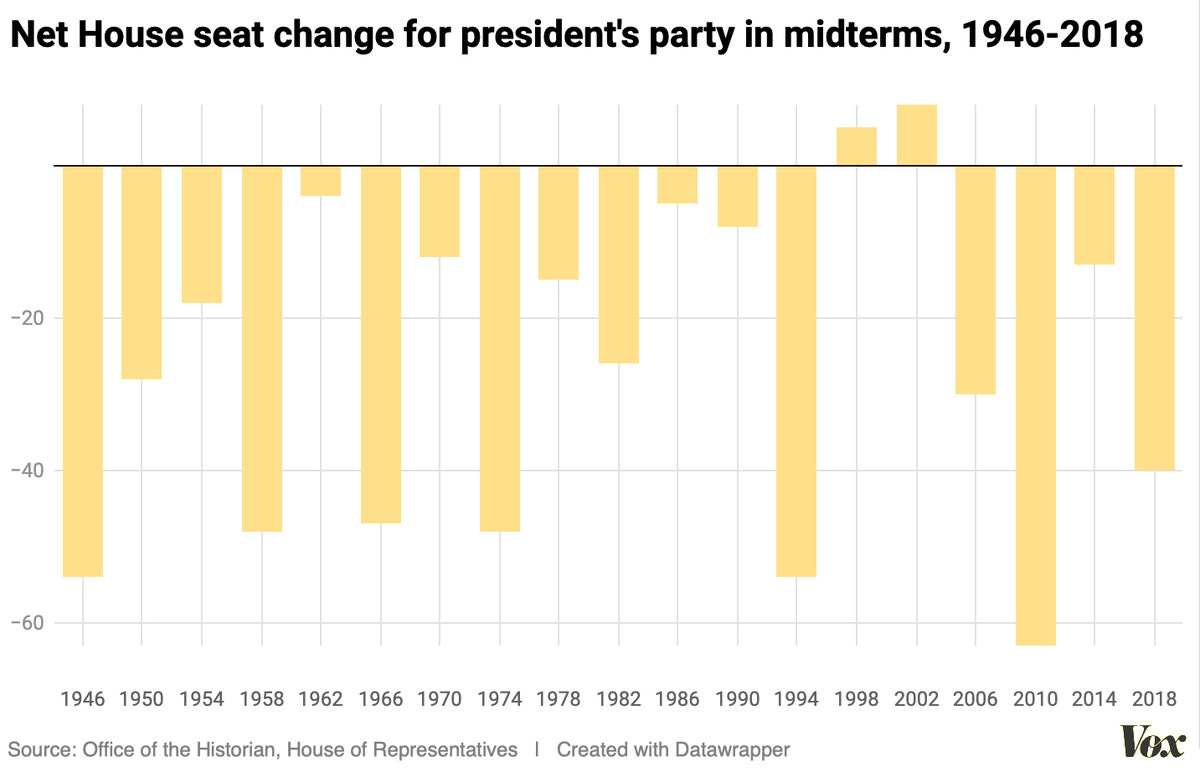Why I'm excited about the midterms, regardless of the outcome
I like it when politics isn't just a discussion among the highly informed
Happy Election Day!
I don’t have any bold predictions about the midterms, but I did want to share the below chart from Nate Cohn’s subscriber-only newsletter at the New York Times.
The chart’s implication is that, while polls seem to put control of the Senate as a tossup, if we assume the same polling errors that we had in 2020, Republicans are likely to gain control of the Senate (by winning in NV, GA, PA, and maybe even AZ and NH).
I think that’s probably right. The whole reason why polls have been biased in recent years towards Democrats is because the kind of low-trust people who refuse to answer polls have become way more likely to be Republicans and the kind of high-trust people who do answer polls have become way more likely to be Democrats. And I think this “trust polarization” has been increasing if anything in the last two years, with Republicans now chiefly in control of the anti-vax movement and the corporate-news-is-bad movement, both remnants of a distrustful, anti-authority left. So I think polls are going to be biased towards Democrats again, and I think the Republicans are going to win the Senate and the House.
Personally, I think it would be better for America if the Democrats held their Senate and House majority. But that contradiction between my hopes and my predictions hasn’t made me any less excited for this election day.
Because election day is when politics is not a game, a debate between friends, a horse-race of entertaining politicians, or a battle of prose. Election day is when people choose their leaders. And I always enjoy Election Night coverage, watching the results come in, regardless of what those results are.
When the leaders you want don’t win—and I think that will happen to both me and the vast majority of the media tonight—I think the right response is not anger or sadness, but rather hope (even faith!) that the country is best led by the sum of its voting population, not by the professional politics-knowers.
But why can the voters never make up their minds?
I think one thing that is very frustrating to both pundits and politicians is “thermostatic” public opinion, where voters respond to government action with a desire for whatever the opposite of that government action is. So if a government spends a lot of money, the people will next vote for a politician who promises not to spend a lot of money. But if the next guy spends no money, the people might vote again for a politician who promises to spend a lot. In this way, the public can act like a thermostat, turning on the air conditioning when it is too hot, and the heating when it is too cool.
This model of the thermostat is often cited as an explanation for why the president’s party basically always loses House seats in the midterm elections.
One reason the thermostatic voting habits of the public frustrate journalists and political scientists so much is that the people who write about politics have strong, consistent views about what policies are wise for this country to pursue, and those policy views usually line up well enough with a political party. I certainly have these strong views, in favor of universal public health insurance, more high-skilled immigration, and paying some college athletes, just to name a few.
But the country as a whole does not decide at a young age what policies are wise and always vote for the party that promises to deliver those, the way that political scientists, pundits, and partisans do. Instead, this country elects presidents who promise one thing and then hampers their power by electing other leaders who promise to oppose that thing. And while that may seem stupid or nonsensical, I don’t really think it is if you imagine an electorate that just doesn’t want that much to change in their country.
Not only is America prosperous as the richest country on earth, the average income of Americans has grown essentially constantly since WWII, all while at the same time, the president’s party has been constantly punished in the midterms.
Although I personally am pretty consistent in my political beliefs and want my policy preferences implemented, it doesn’t shock me that as a whole, the people who live in a prosperous and ever-more-successful country don’t want to elect a unified government that promises to change a lot of stuff. It makes more sense for a happy people in a great nation to elect a government that can’t change much because it is divided.
But what if they vote for the fascist election deniers
You can read opinion piece after opinion piece about how Republicans are now the party of election deniers threatening to end democracy, or even about how at least the MAGA wing of the GOP has become fascist. Joe Biden himself told his donors “It’s not just Trump, it’s the entire philosophy that underpins the — I’m going to say something, it’s like semi-fascism.”
I am unconvinced by these opinion pieces, or by Biden’s eloquent speech. As for the election debate, I’d personally bet on American democracy chugging along at least for the next couple decades, and as for the fascism debate, I don’t see any stakes and I’d rather debate whether something is good or bad than whether it fits political scientists’ definitions of an abstract ideology that’s been dead for 75 years.
And if the voters tomorrow vote for the “semi-fascist election deniers,” I think instead of weeping, we should explore the possibility that the voters are voting for the party they believe will stop the rise of violent crime and halt rising prices, and they don’t see a tradeoff between that and the end of our democracy, and maybe they’re right that there is no tradeoff.
Now, of course, there’s Germany in the 30s, or other moments when voters voted for the demise of their democracy. But for every one of those elections, there’s dozens of others where the political class is convinced it is the end of the world if one party wins, and then that party wins and it isn’t the end of the world.
All hail the Swing Voter
I think there’s another brand of condescending punditry/political science that looks at the swing voter, or the voter that is not sure until November who they’re voting for, or the voter that is pro-immigration and pro-choice but votes for Trump because he sounds like more of a patriot and thinks “isn’t it horrible that the leaders of our country are basically chosen by those people who lack coherent ideology rather than highly informed, highly thoughtful people like me?”
And I think this is the wrong way to look at it. America’s leaders are chosen by the majority of its voters. In close races, still the vast majority of people make up their minds fairly early in the race, and then it becomes the job of the candidates to prove to the people-who-really-don’t-care-that-much-who-wins that they’re the best person for the job.
And I think that’s pretty cool.
While talking about politics to people who are highly informed and thoughtful about it is a fun exercise, I am glad that the neuroses of the highly informed do not govern our country. In addition to being neurotic, the people who write about politics for a living are much more educated, much younger, and much richer than the people whose lives are most affected materially by elections.
So instead of the politics-knowers, let it continue to be the marginally-attached-to-politics people, the both-sides-piss-me-off people, the my-town-seems-perfectly-fine-thank-you people who decide the close races, and who this year decide the balance of power in the Senate and House.
And I have faith that they’ll choose a good long-term course for our country, like they always have.
Happy Election Day.







Wonderful